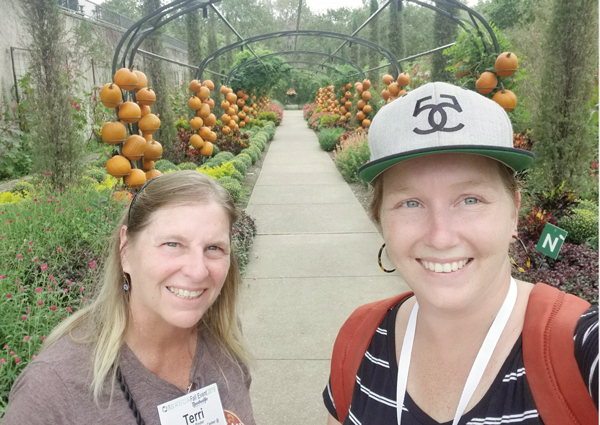12/1/2019
Growing a Sound Mind and Body
Ellen C. Wells

The pursuit of wellness is top of mind—and top of pocketbook—for Americans. A quick online search on the health and wellness industry in the United States shows the value for this segment should be hitting $179 billion by 2020, up from $166.5 billion in 2015. Much of that revenue—and much of consumers’ engagement with their health and wellness—is derived by food and nutrition products, including non-dairy beverages, plant-based foods, organic and natural snacks and probiotics. Coupling healthy eating with the pursuit of bodily fitness and mindfulness, the wellness industry holds great potential for both the product and service providers and the people pursuing a healthier version of themselves.
But what does any of this have to do with horticulture? Green Profit took a look at how some green industry professionals are showing up to serve those searching for wellness.
Therapy Sessions
Hannah Berisford runs a 10,000-sq. ft. greenhouse for eMerge Inc., a Maryland-based organization that provides job training for adults with developmental disabilities. While many of the clients she serves will go on to get jobs with community employers such as a car wash or fast-food restaurant, Hannah believes their time working in the greenhouse is more than just about acquiring job skills. She has seen how the power of plants works to confidence and pride in her clients.
“Some clients will never be able to get jobs in the community because they don’t have the ability to,” Hannah says. “They come to my greenhouse and they’ll do everything required to run the greenhouse—plant, water and care for the plants. But recently I’ve been doing more direct activities with them—horticulture therapy activities—to get their senses going.”
Hannah uses sensory plants—plants with texture, movement, fragrance and the like—to actively involve her students in the horticulture process. “My direct intention is to provide an outcome, whether that be motor skills, hand-eye coordination and engaging the senses,” she says. “For example, an herb garden would be an activity where you could engage the senses to get the brain working—smell, taste, touch.” She has plans to create a sensory garden with plants such as lamb’s ear for touch, snapdragons for snapping, grasses for the sound.
Her clients have responded positively to both the work and the horticulture therapy. “Mentally, it’s been a sense of pride for them to participate in any of the activities we do,” Hannah shares. “It really gives them a sense of purpose because these guys don’t have a lot to look forward to.” And while she believes her clients’ motor skills are improving, she has an overall sense that both their mental health is vastly improving and that they are happier.
The eMerge greenhouse, which is just under a quarter-acre, wasn’t set up as a therapy space when Hannah came on board six years ago. The clients’ main objective was to produce crops for sale at fundraisers to support the greenhouse’s operation. Hannah, who has a special needs brother, felt the program was missing an element—“a direct activity that helped with engaging the clients more,” she explains. “That’s when I took the horticulture therapy course that’s helping me learn what kind of activities I can design for intentional purposes.”
As for applying horticulture therapy to the garden center, Hannah had two superb suggestions. First, bring in a horticulture therapist to plan an educational or informational session or participate in an activity. And second, offer specially designed sensory pots for sale. Sure, your pots already have grasses, fragrant herbs and such … but have you marketed them as horticultural therapy/sensory potted gardens?
Healing Holistically
The Community Garden Center at Pinder’s Nursery in Palm City, Florida, has always been the go-to source for gardening information in that region. Over the years, that information evolved from traditional gardening classes into how to use the garden’s bounty, such as herbs and vegetables. Their class offerings transformed once again, this time to encompass human wellbeing and our interconnectedness with food and our surroundings. Adding this additional layer of information for their customers was the logical next step for co-owner Terri Pinder, who not only is a nurse practitioner but also practices holistic functional medicine through her own practice, Intentionally Well, LLC.
“Our customers turn to us because they trust us,” Terri says, noting that some customers had even been requesting holistic wellness information prior to their offering the classes. Emboldened by several years’ worth of the Garden Media Group’s Garden Trends Report, Terri and her team felt that all signs pointed to gardens and gardening having more to offer than just pretty flowers. In 2018 they began offering the course, Garden In Your Gut, a 101-level class on the human microbiome.
"The model that I teach from is a holistic model, and we came at it from a food standpoint,” Terri explains. “But there are other things—there’s movement, yoga, Walk 15 fitness classes, sound healing, reiki, classes on relationships—all of these are different aspects of being whole and well.”
In addition to her nurse practitioner standing, Terri is in the process of being certified in an emerging field called functional medicine through the Institute of Functional Medicine (IFM.org). “What makes functional medicine a perfect match is that people who garden are willing to put forth an effort for future gain,” Terri says. “We are working with people to help them build their health, and to help them see that for the sacrifices and lifestyle changes they make right now, the payoff isn’t going to be for many seasons down the road.”
The very first Garden In Your Gut class brought out more than 60 people, and on average they still get 20 students when that introductory class is offered (about monthly, Terri says). This class rotates along with Pinder’s other wellness classes, such as Eat the Rainbow and Dirt to Plate.
Which brings us to Pinder’s food- and cooking classes and Terri’s daughter, Kenleigh. A trained chef, Kenleigh leads the charge in cooking class planning, from infused alcohols to Garden to Glass classes, herbs and more. “We’ve recently opened up [class teaching] to the community … and it’s kind of cool to see the community come in and offer their expertise, as well,” Kenleigh says.
Evolving the Pinder class offerings to include holistic information has “definitely been the right thing to do,” Terri notes. “It shows our commitment to our customers as individuals and not just their checkbooks. We are not just looking at you as a customer, we see you as members of our community.” Terri feels that teaching people how to be successful—whether it’s growing the garden or boosting their health—“We want them to be successful with that, too. They really do trust us with that.”
Get Moving
Teri Smith of Smith Acres in Niantic, Connecticut, has been offering yoga classes at her garden center for about three years now with a few different yoga instructors. It’s not something they put much advertising behind—the teachers spread the word and class is also open to employees and friends. Classes take place either before or after hours, and if the store is open when class ends, class participants can do a bit of shopping—especially with their vegetables.
“Everyone comes in and says, 'Oh, it’s just so beautiful in here!' ” Teri shares. Classes are held in the glass greenhouse. She turns on the fountains for that gurgling ambient “spa” feeling, and with the birds chirping in the background, the space is transformed into a relaxing atmosphere. In the summer it does get a little toasty, but hey, that’s a completely appropriate environment for hot yoga, right?
“As far as I’m concerned anytime I can get somebody in my greenhouse that has never been here before for some sort of social event, it’s a good deal for me. That’s why we open up [the store to events] so much.”

Lessons Learned
After years of offering healthy cooking and holistic health classes, Terri and Kenleigh Pinder have a few words of wisdom to share for other garden centers wanting to implement wellness into their own programming.
• “I have 6,500 gardeners on my email list who know, love and trust me and all of our team here on how to grow a garden. We’ve gotten them through some of the hardest work they’ve ever done in their lives. They get it! They get the interconnectedness.”
• “A lot of people say, ‘We don’t have a nurse practitioner on staff, we can’t do this.’ There’s a chiropractor, there’s a functional medicine practitioner, there’s somebody in your community you can bring in.”
• “I advertise these classes not just in our newsletter but also in the alternative health magazines, so it helps us bring in new customers.”
• “It’s been great for all our health. It makes us all think about what we are putting in the fridge and what we serve at our staff meeting. Pizza and wings is now Greek salads.”
• “We put it out on Facebook, ‘Hey, is there anyone interested in teaching a class?’ Even if you’re just reaching out and asking what classes your customers want. For us, it was really powerful to hear the feedback and see the engagement.”
• “I always make a point [during class] to talk about what we are selling. We have a one-on-one with the community teachers about how we are glad to provide this space to you for free but whenever you can, here are the things we hope you can promote during your class.”
• “Before you go and do this, make sure you know how it’s going to impact you. It’s great to have people in your parking lot if you’re teaching a class, but they usually run longer than 20 minutes. If you’re trying to turn your parking spot quicker, there’s a cost to that.”
• “Always take the time to collect an evaluation. It shows that you are really doing it for them, and you’ll learn so much about class times and topics. Plus, they give you beautiful feedback like how awesome you are.” GP
Pictured: Terri and Kenleigh Pinder host cooking and wellness classes at The Community Garden Center at Pinder’s Nursery in Palm City, Florida.